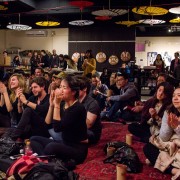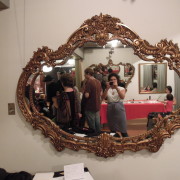Rose Goossen, August 2015
 Theft, Convention, and Selective Memory: Songwriting in the Age of Repetition
Theft, Convention, and Selective Memory: Songwriting in the Age of Repetition
Anyone who has turned on a radio or visited a shopping center in the last twenty years has probably, on at least one occasion, lamented the fate of the song. “How, oh, how,” we cry, “did we ever progress from Bing Crosby to Justin Bieber? How from ‘The Wall’ to the ‘Wrecking Ball’?”
I’ve done it, I admit. When faced with particularly stale examples of the latest chart-topper, I have mourned the state of affairs. This is the golden age of repetition; life is saturated in imagery, slogans, products and content, most of it aimed to stimulate the lower reflex centers and stir up either controversy or a blizzard of dollar bills. Creative people, when presenting new ideas, constantly face the question, “Are you sure that hasn’t been done before?” The quest for originality in such a sea of same-old often seems daunting and fruitless.
While paying my rent in the tower of song, I have done my best to battle conformity with ingenuity. For years, I militantly rejected clichés and conventions, choosing to construct songs that never repeated themselves and bore no resemblance to what was on the radio or the charts. I was always satisfied to know that what I produced was undeniably my own work. However, in recent studies of language and music, I have been surprised to learn that, more often than not, the ear responds best to what has been heard before.
It was Willie Nelson who said that the basic requirements of a good song are three chords and the truth. There is one kind of song known among musicians as a three chord trick, because it uses only the first, fourth and fifth degrees of the scale. This formula has been used, and used effectively, in pop music frequently enough to merit the special nickname. Examples include ‘Wild Thing’ (originally by The Troggs, but covered by everyone) ‘Sweet Home Alabama’ (Lynyrd Skynyrd), and Johnny Cash’s ‘Ring of Fire’. Every one of them is considered a classic, even though their structure is the musical equivalent of a paint-by-numbers. If we expand to our view to include four-chord songs, we can talk about at least fifty percent of everything currently charting on the Billboard Hot 100.
The lyrics of popular songs both past and present are also stuffed with things we’ve heard before. Take the tagline from the best-selling single of all time, Irving Berlin’s ‘White Christmas’:
“May your days be merry and bright,
And may all your Christmases be white.”
I count that as one standard salutation, probably written by millions of well-wishers on real life Christmas cards and since adopted by Hallmark for mass dissemination, plus one repetition mixed with the title of the song to create a simple rhyming couplet.
Or this one, from a recent summer smash hit:
“It’s been a long day without you, my friend,
And I’ll tell you all about it when I see you again.
We’ve come a long way from where we began
And I’ll tell you all about it when I see you again.”
An abundance of clichés! “It’s been a long day” and “we’ve come a long way” are the stuff of text messages and quarterly reviews. They’re the things we say when we’re too zonked to lucidly enunciate our thoughts and feelings. Extra bonus points go to the songwriters (Wiz Khalifa, Charlie Puth, Andrew Cedar and DJ Frank E) for rhyming “again” with “again”. It’s like a hall of mirrors inside this chorus, and yet it spent twelve weeks at Number One.
In his book, ‘Help! For Writers’, Roy Peter Clark reminds us that, “Since everything that is not eternal must begin at some specific time and place, it is logical to assume that clichés were once fresh and original, a quality that led to their being imitated.” With centuries upon centuries of language conventions stacked up in our libraries and our collective memory, it becomes truly difficult to avoid even accidental imitation. New clichés-to-be are being generated and imitated all the time; ever since the popularization of the new phrasal verb “to go viral”, it’s easier than ever for a trend to spread.
Songwriters often make use of clichés because they are memorable and easy to understand. By using a very common language pattern like “It’s been a long day”, an artist can take a shortcut past a listener’s cerebral processes and enter directly into the more sentimental inner chambers of the mind. The phrase has been used so many times before that it has a special express route through consciousness, straight to the memory. Similarly, if a song is composed in a conventional verse-chorus-verse structure, which is itself a kind of musical cliché, the listener will easily retain the pattern and anticipate the changes when it comes time for the big singalong.
An artist casting a eye toward global domination will find that it is necessary to simplify for the sake of the singalong. The singalong is the bread and butter of popular music. We’ve all seen it before: with a mischievous glance that is projected across the arena from at least two large live-feed screens, the performer thrusts his or her microphone out toward the audience, grins and skips around delightedly as the masses scream the lyrics back toward the stage. Now, riddle me this: if a song contains a decorative word from outside everyday English vernacular, such as “synecdoche” or “mellifluous”, do you think they will be singing along in Tokyo? In Milan? In Rio de Janeiro? It’s unlikely. The big machine rarely accommodates artists who take such liberties in their lyrics.
I have been fascinated by the idea of the accessible song for months, and I set a goal for myself to write at least one song that fits the well-worn mold. For my most recent composition, which I performed for the first time at the August edition of Stage Time and Wine, I relied heavily on other songwriters and frankly stole a large amount of content. I used four chords and a standard pop format. I did not cloak the key sentiments in silky vocabulary, but rather spelled them out in standard English. The result? The most appealing song I’ve ever written. It feels like getting away with something nefarious – and I like it.
So, by way of conclusion, I say to all those who would strive to create: take heart, and thieve away. Fret not about the well-placed cliché, for your audience will understand it, even if English is not their first language. It may be true that there is nothing new under the sun, but our recycling technology is better than ever; by turning and turning, we’ll come round right, and sing together for eternity whichever power chorus is stuck on repeat in the heavenly skies.
Bonus feature : Can you find the stolen goods in my lyrics? I robbed Johnny Cash (at least twice), Australian country singer Geoff Mack (who was robbed of a particularly great song by both Lucky Starr and the aforementioned Man In Black), Jane Siberry via k.d. Lang, 19th century poet William Cowper via U2, thriller movie “The Sixth Sense”, Scottish rock group Wet Wet Wet via ‘Love Actually’, local musician Moshe Foster’s ‘Cotton Threads’ and yes, my own mother.
I Fell In
Love has many faces, they change from day to day.
Love is always moving in mysterious ways.
I see love in kitchens and in carpeted halls.
I learned it from my mama, she says love conquers all.
Chorus:
You can run far, you can run fast
But love is gonna chase you down.
Whether it lasts or whether it fades
Love is gonna make the change.
You can’t be surprised when you wake up and find
That love is all around
So if you want to get out, you’ll have to fall in.
I have seen the world from below and from above.
I’ve been everywhere, man. I’ve been everywhere but love.
Some girls like to ramble, some girls just have to roam.
This girl’s been around, love, now will you take her home?
Repeat Chorus
I fell in and love surrounded me.
I fell in so deep I couldn’t breathe.
I fell in and while my face turned blue
My heart was red, and beating for you.
I know love’s not a question of how much or how long
For if love could be answered we wouldn’t need so many songs.
Somewhere beyond our anger, sometime after our grief.
Somewhere in between the lines, that’s where love will be.
I fell into that burning ring.
I fell in and love was everything.
I fell in and my plans fell through.
When I lost my way, I found you.
So you can run far and you can run fast
by Rose Goossen, 2015
(c) Copyright 2015 Red Room. Material on this site is the property of contributing members of the Red Room Community. Please do not copy any part of this publication. Thank you.









Leave a Reply
Want to join the discussion?Feel free to contribute!